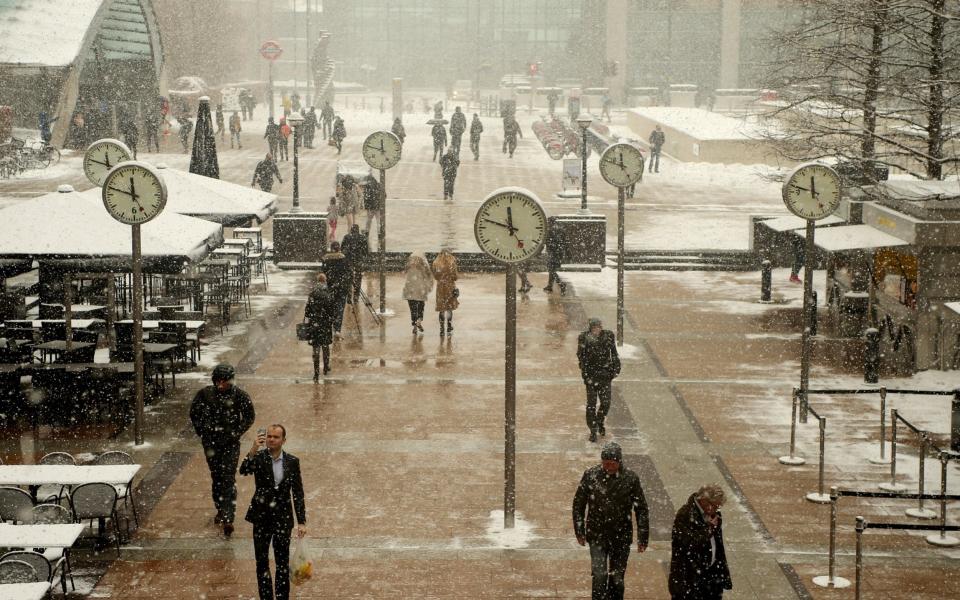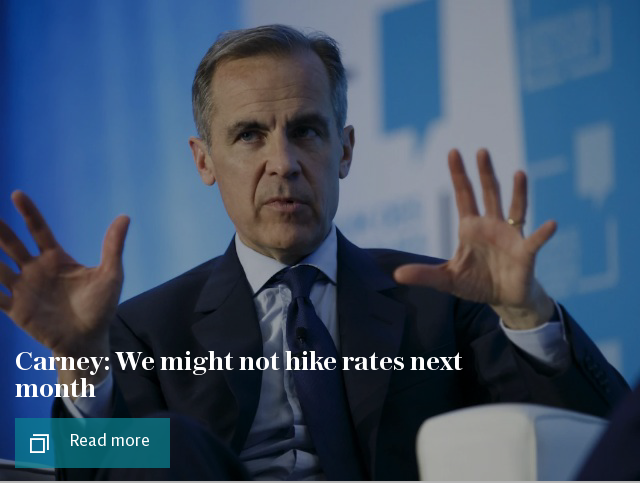UK economy grinds to a halt as GDP growth falls to five-year low

Britain’s economy ground to a halt in the first three months of the year as bad weather piled woes on top of squeezed household finances and a troubled construction industry.
GDP growth plunged to just 0.1pc in the first quarter of this year compared to the last quarter of 2017.
By contrast, in the previous quarter, the economy grew by 0.4pc.
Mark Carney, Governor of the Bank of England, is now expected to keep interest rates on hold at the Bank’s meeting next month, cancelling a long-anticipated hike.
“Our initial estimate shows the UK economy growing at its slowest pace in more than five years with weaker manufacturing growth, subdued consumer-facing industries and construction output falling significantly,” said Rob Kent-Smith at the Office for National Statistics.
“While the snow had some impact on the economy, particularly in construction and some areas of retail, its overall effect was limited with the bad weather actually boosting energy supply and online sales.”
GDP per head fell by 0.1pc quarter on quarter, the first drop in two years.
The construction sector’s output plunged by 3.3pc, dropping in every month - not just those with the worst weather.
Manufacturing slowed to grow by just 0.2pc.
The 'Beast from the East' weather front hit hotels and restaurants, damaging the dominant services sector, which expanded by a sluggish 0.3pc - though the ONS found little evidence of the snow causing the slowdown in the wider industry.
Production industries rose by a more impressive 0.7pc, as the oil and gas sector rebounded from pipeline closures late last year, and families turned up the heating.
The Bank of England had anticipated a smaller slowdown, last month cutting its forecast to 0.3pc after the snowy spell.
But now Mr Carney and his colleagues have to judge whether or not this more severe crunch will have a longer-term effect on the economy.
The ONS believes only part of the slowdown was caused by the weather, which could indicate more underlying concerns for growth.

Markets - which at the start of this month were almost certain of a May rate hike - now think the next increase could be delayed until September.
The pound slumped by 0.8pc against the dollar as a result, to $1.3815.
Economists hope for an improvement in growth in the coming months.
On a monthly basis, the estimates indicate overall GDP growth was better in March than in February even though the worst of the cold came in the later month, which may hint an improvement is on the way.
“The slowdown in services was not broad based – it was concentrated in the retail sector which tends to be hit hardest by bad weather,” said Paul Hollingsworth at Capital Economics.
“As a result, this slow patch should prove to be transitory, if past experience is anything to go by.”
One factor harming growth has been the fall in household spending power, as inflation outstripped wage rises for much of the past year, largely because the weak pound pushed up import costs.
But that pressure should now be over as earnings are once more outpacing prices, which should improve the economy’s prospects.
Employment is also at a record high, which should support household spending.
“Much of the activity lost to the bad weather in the first quarter should eventually be made up,” said Howard Archer, chief economic adviser to the EY Item Club, predicting growth will rebound to 0.5pc for the second quarter.
“Growth over the rest of 2018 should be helped by the squeeze on consumers easing as the year progresses.”

 Yahoo Finance
Yahoo Finance 